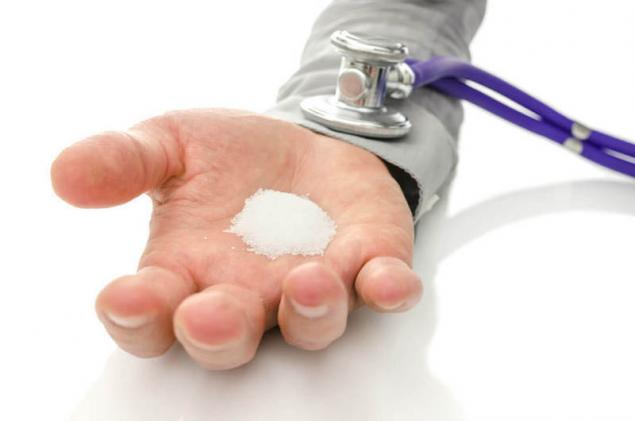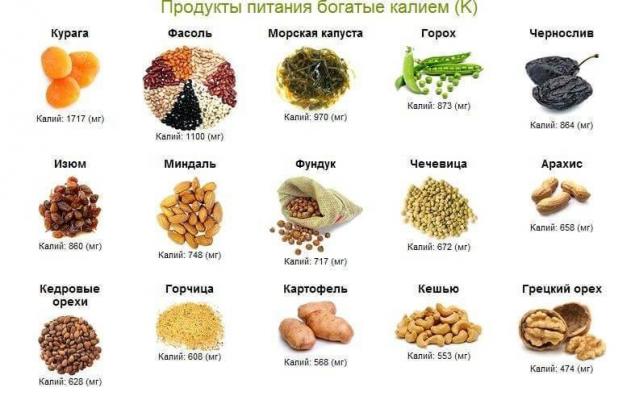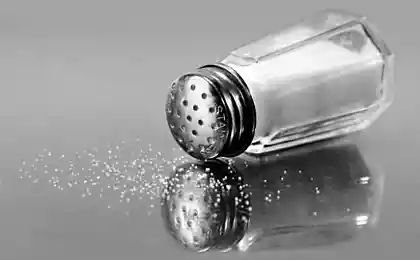539
Can salt-free diet hurt
American expert Dr. Ronald Hoffman writes:
"I use a lot of salt. I eat pickles and sauerkraut. I liberally salted boiled eggs, meat, poultry and fish. I'm seriously toying with the idea of the origin of the word salad is from the Latin "sal", which can be translated approximately as salty raw vegetables, and therefore did not hesitate to shake salt over the dish with a green salad, arugula or cabbage. But for long bike rides in hot weather, I "fill" a balanced electrolyte solution with a high content of sodium.
My blood pressure is 110/70, and I do not suffer from heart failure, tinnitus, swelling of the legs and other diseases that are associated with reduced consumption of salt. Oh, I forgot to tell you, I'm 63 years old, which is another reason to limit its use, since it is believed that the kidneys of elderly people are not able to excrete any excess salt."

Of course, all of the above is contrary to numerous recommendations of doctors who endlessly and mindlessly repeated everywhere. So, the world health organization (who) recommends that all adults consume no more than 2 grams of salt per day, regardless of whether they have high blood pressure. The American heart Association goes even further, urging Americans to limit their daily salt intake of 1.5 grams, given that they consume an average of more than 3.4 grams a day.
New York, who became a pioneer in the spread of the Smoking ban (2003) and restrictions on TRANS fats (2006) when mayor Michael Bloomberg passed a new law requiring city restaurants to place an ominous sign in the form of a salt in the black triangle as a warning in front of the dishes, the salt content of which exceeds 2.3 grams, that is the upper limit recommended by the Federal government.
This rule challenged in court by the National Association of restaurateurs was recently confirmed, and violators can expect a fine of $ 200. The mayor of new York bill de Blasio applauded the court's decision, calling it a manifestation of "common sense" in the interests of society.
Of course, there are cases when the restriction of the use of salt does have beneficial effects. Some, but not all, people with hypertension react to it positively. The same is true in relation to those who suffer from renal impairment, since they are not able to filter out excess salt is dangerous and can increase in volume.
Many Americans with chronic heart failure should also limit salt intake to prevent hypervolemia. Told (though this may be true) that in his 80 odd Hollywood superstar James Cagney ignored the advice of his doctor and lay off the corned beef sandwiches, going to the hospital only in cases of extreme necessity.
However, everything in medicine is sometimes not as easy as it might seem at first glance. Universal recommendations on limiting salt intake are associated with a surprisingly contradictory data. Recent research has become just another confirmation of the fact that generic advice should be treated with caution.
Previous research has allowed scientists to come to the conclusion that low salt intake, less than 1 gram a day, actually causes a paradoxical effect – an increase in the risk of death from cardiovascular disease. How can this be? Non-profit organization "Cochrane review study", which is considered one of the most respected referees in the field of scientific evidence, came to the conclusion that low salt intake can significantly increase the production of hormones of the kidney, which is responsible for raising blood pressure. These hormones are often subject to the impact of the blocking products that are designed to reduce the pressure. It all looks quite convincing, because in the absence of a sufficient amount of salt the body mobilizes its defense mechanisms against low blood pressure and trying to maintain his level.
In addition, salt-free diet can lead to increased levels of catecholamines, neurotransmitters stress, such as adrenaline and dopamine, which accelerate heart rate and cause constriction of blood vessels. Catecholamines are the mechanisms linking stress and high blood pressure. Actually, the popular category of drugs used for hypertension, beta-blockers, are aimed at blunting the activity of these chemical mediators.
Finally, some research suggests that, for unknown reasons, low consumption of salt provokes a rise in the General level of cholesterol and triglycerides.
A recent study sheds light on nizkosoleva effect of diets on levels of inflammation, a recognized precursor to cardiovascular risks. Most people are familiar with C-reactive protein as an indicator of susceptibility to heart attacks. To it scientists added new token that has not received wide distribution under the name of GlycA, accurate indicator of arterial inflammation associated with infection.
Researchers have discovered that the lower the salt intake, the higher the levels of these markers. Moreover, increase not only they, but also the classic markers of inflammation such as factor stimulation of b-cells IL-6 and tumor necrosis factor alpha.
The authors guess that a low-salt diet provokes a compensatory release of renin, angiotensin and aldosterone. And they, in turn, reduce the levels of adiponectin is that, in addition to improving insulin resistance and weight gain, provoking inflammation.
Although the data obtained should not mean "green light" to unlimited consumption of salt, they do indicate that we should think carefully before setting universal rules relating to the restriction of its consumption. While some people certainly should avoid excess of salt, most healthy people, a moderate amount won't hurt.
In addition, the research findings, claiming that the excess salt creates a risk to health, contrary to the fact that it was not the salt shaker, but processed foods are people in the developed countries the main source of salt. Is salt the true culprit of the problems or is it refined carbohydrates, chemical food additives, low-quality fats and oils, as well as lack of fiber and critical vitamins, minerals and polyphenols?
One of the ways to get rid of harmful effects of restrictions in the intake of salt is the shift of attention from one only of sodium total amount of sodium and potassium. Add in the daily diet of potassium-rich fresh fruits and vegetables can eliminate the harm associated with salt.

In addition, the maintenance of the sports form also facilitates the effects of salt on the body. Most of us don't regularly sweat harmful to allow your pores to help the kidneys get rid of excess salt load.published
Translation: Igor Abramov
P. S. And remember, only by changing their consumption — together we change the world! ©
Source: mixednews.ru/archives/106833
"I use a lot of salt. I eat pickles and sauerkraut. I liberally salted boiled eggs, meat, poultry and fish. I'm seriously toying with the idea of the origin of the word salad is from the Latin "sal", which can be translated approximately as salty raw vegetables, and therefore did not hesitate to shake salt over the dish with a green salad, arugula or cabbage. But for long bike rides in hot weather, I "fill" a balanced electrolyte solution with a high content of sodium.
My blood pressure is 110/70, and I do not suffer from heart failure, tinnitus, swelling of the legs and other diseases that are associated with reduced consumption of salt. Oh, I forgot to tell you, I'm 63 years old, which is another reason to limit its use, since it is believed that the kidneys of elderly people are not able to excrete any excess salt."

Of course, all of the above is contrary to numerous recommendations of doctors who endlessly and mindlessly repeated everywhere. So, the world health organization (who) recommends that all adults consume no more than 2 grams of salt per day, regardless of whether they have high blood pressure. The American heart Association goes even further, urging Americans to limit their daily salt intake of 1.5 grams, given that they consume an average of more than 3.4 grams a day.
New York, who became a pioneer in the spread of the Smoking ban (2003) and restrictions on TRANS fats (2006) when mayor Michael Bloomberg passed a new law requiring city restaurants to place an ominous sign in the form of a salt in the black triangle as a warning in front of the dishes, the salt content of which exceeds 2.3 grams, that is the upper limit recommended by the Federal government.
This rule challenged in court by the National Association of restaurateurs was recently confirmed, and violators can expect a fine of $ 200. The mayor of new York bill de Blasio applauded the court's decision, calling it a manifestation of "common sense" in the interests of society.
Of course, there are cases when the restriction of the use of salt does have beneficial effects. Some, but not all, people with hypertension react to it positively. The same is true in relation to those who suffer from renal impairment, since they are not able to filter out excess salt is dangerous and can increase in volume.
Many Americans with chronic heart failure should also limit salt intake to prevent hypervolemia. Told (though this may be true) that in his 80 odd Hollywood superstar James Cagney ignored the advice of his doctor and lay off the corned beef sandwiches, going to the hospital only in cases of extreme necessity.
However, everything in medicine is sometimes not as easy as it might seem at first glance. Universal recommendations on limiting salt intake are associated with a surprisingly contradictory data. Recent research has become just another confirmation of the fact that generic advice should be treated with caution.
Previous research has allowed scientists to come to the conclusion that low salt intake, less than 1 gram a day, actually causes a paradoxical effect – an increase in the risk of death from cardiovascular disease. How can this be? Non-profit organization "Cochrane review study", which is considered one of the most respected referees in the field of scientific evidence, came to the conclusion that low salt intake can significantly increase the production of hormones of the kidney, which is responsible for raising blood pressure. These hormones are often subject to the impact of the blocking products that are designed to reduce the pressure. It all looks quite convincing, because in the absence of a sufficient amount of salt the body mobilizes its defense mechanisms against low blood pressure and trying to maintain his level.
In addition, salt-free diet can lead to increased levels of catecholamines, neurotransmitters stress, such as adrenaline and dopamine, which accelerate heart rate and cause constriction of blood vessels. Catecholamines are the mechanisms linking stress and high blood pressure. Actually, the popular category of drugs used for hypertension, beta-blockers, are aimed at blunting the activity of these chemical mediators.
Finally, some research suggests that, for unknown reasons, low consumption of salt provokes a rise in the General level of cholesterol and triglycerides.
A recent study sheds light on nizkosoleva effect of diets on levels of inflammation, a recognized precursor to cardiovascular risks. Most people are familiar with C-reactive protein as an indicator of susceptibility to heart attacks. To it scientists added new token that has not received wide distribution under the name of GlycA, accurate indicator of arterial inflammation associated with infection.
Researchers have discovered that the lower the salt intake, the higher the levels of these markers. Moreover, increase not only they, but also the classic markers of inflammation such as factor stimulation of b-cells IL-6 and tumor necrosis factor alpha.
The authors guess that a low-salt diet provokes a compensatory release of renin, angiotensin and aldosterone. And they, in turn, reduce the levels of adiponectin is that, in addition to improving insulin resistance and weight gain, provoking inflammation.
Although the data obtained should not mean "green light" to unlimited consumption of salt, they do indicate that we should think carefully before setting universal rules relating to the restriction of its consumption. While some people certainly should avoid excess of salt, most healthy people, a moderate amount won't hurt.
In addition, the research findings, claiming that the excess salt creates a risk to health, contrary to the fact that it was not the salt shaker, but processed foods are people in the developed countries the main source of salt. Is salt the true culprit of the problems or is it refined carbohydrates, chemical food additives, low-quality fats and oils, as well as lack of fiber and critical vitamins, minerals and polyphenols?
One of the ways to get rid of harmful effects of restrictions in the intake of salt is the shift of attention from one only of sodium total amount of sodium and potassium. Add in the daily diet of potassium-rich fresh fruits and vegetables can eliminate the harm associated with salt.

In addition, the maintenance of the sports form also facilitates the effects of salt on the body. Most of us don't regularly sweat harmful to allow your pores to help the kidneys get rid of excess salt load.published
Translation: Igor Abramov
P. S. And remember, only by changing their consumption — together we change the world! ©
Source: mixednews.ru/archives/106833























